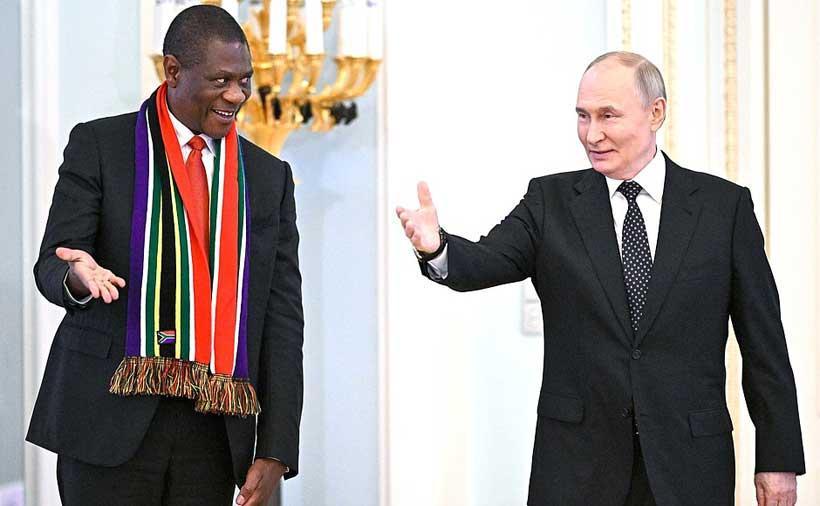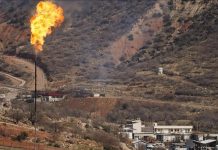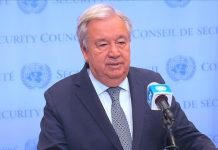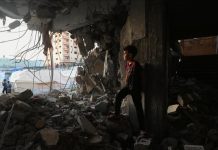By
Kester Kenn Klomegah
Africa-Press – Tanzania. Amidst the dominating geopolitical and economic themes at the 28th St. Petersburg International Economic Forum (SPIEF), African participants were practically in search of potential business opportunities. South African Vice President Paul Mashatile, in his address during the plenary session attended by President Vladimir Putin, raised the importance of Africa’s trade and economic cooperation with Russia. Mashatile earlier participated in the Russia-South Africa business dialogue and also with Prime Minister Mikhail Mishustin.
Ultimately, the increased number of Africans implied reaffirmation of their commitment to harnessing the unlock new growth of opportunities for local African businesses from the Russian Federation. That high flow of Africans to St. Petersburg (which received more than 20,000 guests from 140 countries) highlighted the critical importance of the shifting trade dynamics in the region after the Soviet collapse. While Russia’s position was to increase exports to Africa, Paul Mashatile questioned the possibility of creating an environment to foster increased economic activity for African entrepreneurs in the Russian Federation. He also emphasized the mutual promotion of a better investment climate for African entrepreneurs in addition to reviewing rules and regulations for trade transactions.
The St. Petersburg plenary session had an interesting panel: China and Indonesia—from ASEAN—then Bahrain and Russia. We can also underline the fact that South Africa is together with China and Russia as staunch members of BRICS. The theme was to discuss economic challenges in the context of emerging multipolar architecture. Sky News Arabia General Manager and presenter Nadim Daoud Koteich, who moderated the session, concluded, “And still some people would say Vladimir Putin is isolated. Rather, it says how multipolar the world has become.”
President Vladimir Putin, in his speech, noted that the St. Petersburg International Economic Forum was a good platform for expanding ties and meeting with partners, both from Russia and other countries. In other words, it also related to economic ties between Russia and South Africa, which, of course, with many other African countries, are successfully developing based on the principles of comprehensive strategic partnership, equality, and mutual respect.
That aside, generally, African entrepreneurs’ trade chorus with Russia has focused on the necessity to facilitate rules and regulations and accelerate efforts for promoting trade within the complexity of geopolitical rivalry and competition. But Russian technocrats and bureaucrats at the appropriate Russian ministries are reviewing to what extent and how to make the necessary changes. In connection to this point, Putin has over the years mentioned the necessity to improve bilateral trade relations with foreign partners. At the plenary session, Putin reiterated Russia planned “to develop trade ties with its partners by removing barriers, opening up market niches, and deepening investment cooperation.”
Towards the end of his lengthy speech, President Putin painted the global picture for the audience, the fully packed hall, to understand that the non-Western group, BRICS (Brazil, Russia, India, China, and South Africa), is setting the bar in the development of such a platform; a stronger and more effective association would change the world (the formation of a new global growth model in the spheres ranging from politics through economy to social and cultural life) for future generations.
“The global challenges facing the modern world certainly require a global response. Solving problems alone, especially at someone else’s expense, is simply impossible—it is an illusion. Only joint actions within the framework of an organization such as BRICS and some other formats can ensure the movement of the entire civilization forward,” concluded Putin.
Taking his turn at the plenary session, South African Vice President Paul Mashatile noted, with a unique historical experience, that the St. Petersburg Economic Forum remains one of the valuable platforms where geopolitics can be discussed, where geo-economic relations are formed, and where the possibility of dialogue remains.
Mashatile asked for a collective gratitude for President Putin for his wonderful, brilliant leadership. “This is especially true for the countries of the Global South. We need to have a platform where we could ensure cooperation, where we could exchange ideas, and where we could present innovative plans,” Mashatile explicitly explained and further added that Africa does not necessarily need to turn to anyone for food handouts. But instead, Africa must focus on development, and similarly other countries of the Global South.
As the continent faces a multitude of challenges, unity now stands large as an illusion, and the economy is fragmented; the path would never be easy to multipolarity. In this sense, Mashatile told the audience that in order to ensure equality in the world, in the most difficult times, friends must stick together. That is why the countries of the Global South must work together.
Obviously, with the new policy paradigms, Russia has to move more into action by addressing issues arrived at at previous summits, conferences, and bilateral meetings. South African Vice President Paul Mashatile’s discussions with both Prime Minister Mishustin and President Putin have understandably focused on improving economic cooperation.
“We agreed it is important to increase trade volumes, especially bilateral trade. So we looked at a variety of sectors. We also talked about the agricultural sector. We export fruits to Russia, especially citrus fruits, and we export wines. But we must increase the volumes. We all understand that we must do more. We must increase trade between Russia and Africa,” he said.
In addition to adopting a valuable approach and, most importantly, to stimulate essential aspects of bilateral relations, it is also important to fight bureaucracy. Some businessmen spoke about the bottlenecks they encounter in some aspects that complicate their work and hinder trade with African partners. These are primarily financial issues, the situation with currencies—everything that is necessary for the effective development, of course, and the general increase in trade.
Many African countries, including South Africa, consider the African Continental Free Trade Area (AfCFTA) a historic opportunity to deepen economic ties, first with regional and continental neighbors, and further to expand market access for their respective goods and services abroad. Notably, intra-African trade remains their starting point of strength, especially with the AfCFTA creating a single consumer market of an estimated 1.4 billion people.
It is often mentioned in official speeches that Russia and Africa share common approaches to addressing bilateral economic and trade issues on the agenda and coordinate efforts on international platforms. Trade with key external partners is higher than that of Russia. In fact, following the second Russia-Africa summit in St. Petersburg in 2023, a substantial package of joint documents was adopted, including a policy declaration and an action plan through 2026.
Let us acknowledge some achievements recorded over these few years. Some practical results have started trickling in, noticeable though. But analyzing current developments, there are indications that Russia-Africa trade volume has only increased slightly to US$24 billion. In October 2019, Putin, however, promised to raise bilateral trade volume to US$40 billion before the second Russia-Africa summit. That summit took place in July 2023, and trade figures still fell far below what was targeted. Now, Russia plans to hold the third Africa Summit in 2026.
moderndiplomacy
For More News And Analysis About Tanzania Follow Africa-Press







